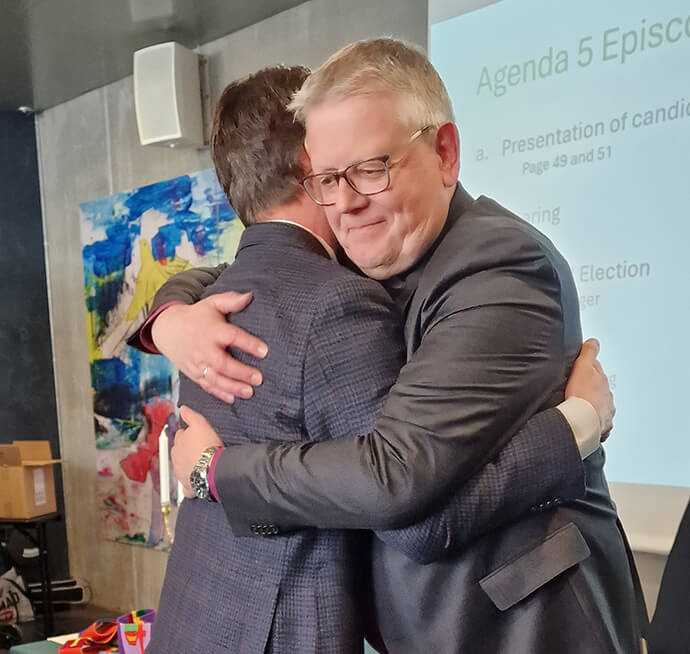Key points:
- The Northern Europe and Eurasia Central Conference elected the Rev. Knut Refsdal as a United Methodist bishop on the 26th ballot.
- Refsdal has ecumenical experience. At the time of his election, he is serving a congregation in the Church of Norway, a Lutheran denomination.
- Earlier in the meeting, the central conference finalized the departure of four Eurasian annual conferences, which are leaving to form an autonomous Methodist church.
The Rev. Knut Refsdal, a pastor in Norway, has been elected as a United Methodist bishop by the Northern Europe and Eurasia Central Conference.
Refsdal, 55, was elected April 4 by delegates meeting in Copenhagen. After seven hours and on the 26th ballot, he received 30 votes out of 40 valid votes cast. He needed 27 to be elected.
“I feel first and foremost a sense of gratitude for the trust that the church has shown me,” Refsdal said upon his election.
“I have mixed feelings right now. I am overwhelmed, tired and grateful. … It is a privilege to be part of the church’s leadership. I believe we have many opportunities in the time ahead, and I have great expectations. The church is a movement of hope, a hope that we bring to the world.
“We are entering a time of change in the Methodist landscape in Europe, and we want to work for a closer community. If we want to come together in a single central conference, I think that could be a good challenge for us.”
Asked if he has a Scripture that has followed him, Refsdal says that he has carried Psalm 37.5 with him since he was 15 years old. "Commit your way to the Lord! Trust in him, and he will act.”
Refsdal will lead the Nordic-Baltic-Ukraine Episcopal Area, succeeding Bishop Christian Alsted, who is retiring. Refsdal is scheduled to take office May 25.

In the Northern Europe and Eurasia Central Conference, bishops are elected to an eight-year term and can be re-elected to a second term of four years. A bishop who has served a second term and will reach the official retirement age in his or her country within the following four years can be re-elected for a third term of four years.
Refsdal, an ordained elder in the Norway Conference since 1994, has previous experience as a pastor in Sarpsborg and Moss, assistant to the bishop, affiliate professor of the United Methodist Theological Seminary in Oslo and district superintendent.
He also has longtime experience in ecumenical work. He has served as a senior executive officer and project leader for the Christian Council of Norway as well as the ecumenical council’s top executive from 2012 to 2018. He also has served on the board of The United Methodist Church’s Office of Christian Unity and Interreligious Relations and as a member of the Stakeholders’ Forum for the Methodist Ecumenical Office Rome. Since 2024, he has served as a pastor in Jeløy in the Church of Norway, the country’s Lutheran denomination. United Methodist clergy are eligible to pastor Lutheran churches.

He is a prolific writer who has published sermons and devotions as well as other theological work.
He has a Master in Theology from the United Methodist Theological Seminary in Oslo and has continued his education in business, personnel management, conflict management, leadership and religious studies.
He and his wife, Åshild Skiri Refsdal, have three children: Andreas, Fredrik and Astrid. He knows Norwegian, Danish, Swedish, English and German.
The Nordic-Baltic-Ukraine Episcopal Area encompasses the United Methodist presence in six annual conferences across eight countries: Denmark, Finland Latvia, Lithuania Norway, Sweden, Moldova and Ukraine. Annual conferences are church organizational bodies consisting of multiple congregations and other ministries.
Earlier in the meeting, the central conference finalized the departure of four Eurasia annual conferences, the last step in a move approved at last year’s General Conference. The Eurasian annual conferences encompass churches in Russia, Belarus, Kyrgyzstan and Kazakhstan.
Delegates from the Eurasia annual conferences joined online at the beginning of the central conference. After the vote on their annual conferences’ dissolution and final goodbyes, the Eurasian delegates left the meeting to reorganize as an autonomous Methodist church.
The United Methodist Church has eight central conferences — church regions in Africa, Europe and the Philippines — with Southern Africa and East Africa as the newest additions. Central conferences, which each consist of multiple annual conferences, elect bishops and have the authority to adapt parts of the Book of Discipline, the denomination’s policy book, as their missional contexts require.
Subscribe to our
e-newsletter
In The United Methodist Church, bishops are ordained elders who are called to “lead and oversee the spiritual and temporal affairs of The United Methodist Church.”
Bishops are responsible for appointing clergy. They also are the first stop when clergy face complaints under church law.
In addition, bishops serve as board members or chairs of general agencies and other denomination-wide ministries.
Refsdal will be consecrated a bishop on April 6 near the conclusion of the central conference session. Offering will be collected for The United Methodist Church in Ukraine.
Ellingsen is head of communications for The United Methodist Church in Norway.
News media contact: Julie Dwyer at (615) 742-5470 or newsdesk@umnews.org. To read more United Methodist news, subscribe to the free UM News Digests.




